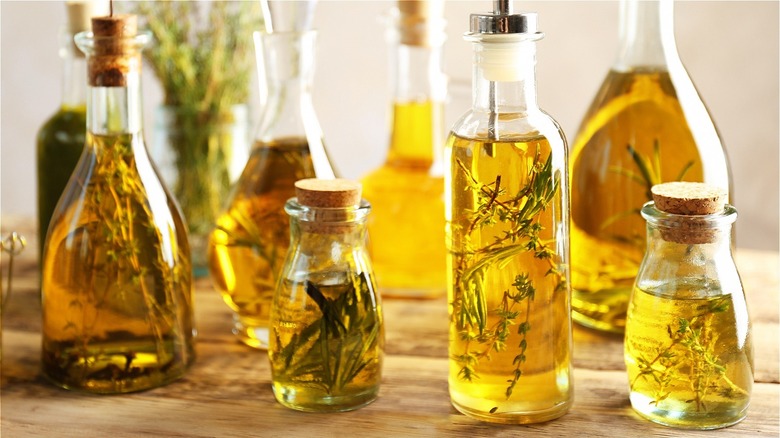Why Professional Chefs Never Buy Store-Bought Infused Oils
Some of the food trends we see entering our home kitchens often start with experts considering thoughtfully what ingredients we use in our meals. These conversations usually revolve around the quality, freshness, and accessibility of those ingredients. One surefire way to kick up the quality in your cooking, whether it's a simple meal at home or a lavish dinner party, is by incorporating your own infused olive oils.
For a long time, infused oils weren't even available for purchase in-store. According to the New York Times, professional chefs have been making them in their kitchens since the 1970s due in part to their versatility in different food preparations. They can be used as a condiment, dressing, sauce starter, or even as cooking oil in more complex dishes. They're also cholesterol-free compared to more traditional foundational ingredients like butter, making for an all-around healthier option.
While grocery stores now offer a myriad of infused oils, they're not always what they're advertised to be. For one, cheffing it up in your own kitchen is not only a fun experiment in creativity, it also gives you a unique level of flexibility. You can deepen flavors or intensity as you see fit, exercising control, restraint, and adeptness based on what your favorite recipes call for. If you're cooking Sichuan, you can have pepper-infused chili oil at the ready. If you're having salad, maybe a Provencal-style, infused with basil, peppers, and garlic, is best.
Are store-bought infused oils worth it?
Another factor that affects both professional chefs and home cooks is the cost of ingredients. Higher-quality store-bought infused olive oils are often pricier. Even just plain olive oil tends to be expensive, due to its farm-to-table journey and the difficulty of harvesting it. There's a certain price point threshold that you have to reach to really trust the quality of what you're buying. If you skimp, you risk a pungent or rancid product that's been sitting on the shelf for far too long. Overall, infused oils you see at the store are less fresh than what you can make in your own kitchen.
If you want to try your hand at infusing olive oil, take a page from the resourcefulness of professional chefs. As chef Karla Lomeli of the Michelin-starred restaurant Koldo Royo in Mallorca, Spain, explains to Eat This Not That, "The infusion of certain ingredients into the olive oil is very easy to do. All you need is to control the heat so as not to burn the olive oil." If you're a fan of spice, Lomeli suggests adding some crushed red pepper flakes to your oil. Heat it up, let it infuse, then strain the flakes out. Once you get the hang of that, you can try incorporating other herbs and spices like rosemary, thyme, basil, garlic, peppers, and tomatoes. Even upcycled ingredients like lobster shells can be used to create a lobster-infused oil perfect for a seafood night.

